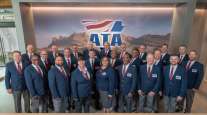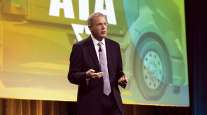Managing Editor, Features and Multimedia
Spear Says Technology, Policy Can Advance Trucking Agenda

This story appears in the March 6 print edition of Transport Topics.
American Trucking Associations President Chris Spear, during a flurry of presentations last week, touted the federation’s efforts to tap into technological innovation and to work with the Trump administration to achieve policy goals.
Spear made the comments at events for technology, maintenance, and governmental supporters of the freight transportation industry.
At trucking technology supplier Omnitracs’ user conference Feb. 27 in Phoenix, Spear said the industry should embrace opportunities to improve safety and efficiency through automated driving and other technologies.
A day later, at the federation’s Technology & Maintenance Council annual meeting in Nashville, Tennessee, he said President Trump is not beholden to Washington and that it is important for the trucking industry to attempt to understand him.
TMC PHOTO GALLERY: Exhibit hall and more
COMPLETE TMC 2017 COVERAGE: All stories, plus blog posts, video and more
“The only people he is beholden to are the people who voted for him,” Spear said. “We need to understand his agenda, and that’s difficult. It doesn’t come in the form of 140 characters, and it doesn’t come from 77-minute press conferences.”
But Spear said he believes the president will “go down his checklist” and “do everything he campaigned for.”
“I look for this president to unleash the private sector,” Spear said. “I don’t look for mandates, I look for innovation.”
Contrary to some of the “hype” about driverless trucks, Spear said he’s not concerned that automated driving technology will displace drivers.
“This is really driver-assist technology, not driverless technology,” he said. “We need to focus on that reality.”
In fact, automated trucks have the potential to help drivers, Spear said, by enabling them to move freight more efficiently, learn additional skills and potentially earn more pay.
“I’m not threatened by technology. I think we need to embrace it,” he said. “It’s a catalyst to making our industry better and, as a result, America stronger and our economy even better.”
Spear said he believes the widespread adoption of autonomous vehicle technology is at least 20 to 25 years away. but he reiterated his stance that trucking “must take its seat at the table” to help shape the development of this technology and its regulatory framework.
He also predicted that trucking will lead the move toward automation ahead of the passenger car market, which could find it challenging to persuade buyers to pay a premium for automated driving capabilities.
The trucking market, however, stands to benefit from improved safety, reduced fuel consumption and emissions, and potentially even less traffic congestion. If the technology can generate that value proposition, carriers will invest in it, Spear said.
“We could accelerate and adopt this technology faster than any other mode out there. That’s a message we need to be carrying to key decision makers,” he said. “They need to be focused on us first. We’re the test bed. We’re the innovators.”
Regarding the new political landscape, Spear said Trump is unique in that he has come to Washington owing nobody anything. “This president is pretty much a freelancer, and you’ve seen that in his behavior,” he said.
While it’s easy to be distracted by Trump’s proclivity to respond to any opposition with an onslaught of comments via Twitter, the industry should focus squarely on his policy agenda, Spear said.
“If we can take the time to filter all that noise out and focus on the opportunities that lie ahead with this president, and the fact that he’s not loyal to anybody in Washington, we could put some pretty big wins on the board, and that excites me and my team,” he said.
Spear also said he expects the federal government’s upcoming electronic logging device mandate to go into effect without delay, noting that it was included in the Moving Ahead for Progress in the 21st Century Act (MAP-21), which was passed by a Republican Congress and signed into law in July 2012.
“I firmly believe this rule will be the law of land, in full force and effect, come December 2017,” he said. “It’s taking our industry forward.”
On March 2, before a meeting of state and other transportation officials in Washington, D.C., Spear stressed the importance of the proposed length of Trump’s infrastructure agenda rather than its price tag.
“A trillion dollars is a lot of money, but even more than the money, having 10 years of certainty is just a refreshing approach,” Spear told the American Association of State Highway and Transportation Officials.
“The trucking industry has really grown tired of watching our roads and bridges deteriorate,” he said, adding that trucking loses $49.6 billion a year sitting in traffic.
Spear also called for a fuel-tax increase of 20 cents per gallon to help pay to fix the nation’s crumbling infrastructure. Federal taxes are 24.4 cents a gallon for diesel and 18.4 cents for gasoline.
He also criticized members of Congress with an anti-tax stance.
“We’re fighting over scraps,” Spear said. “It’s not, what’s good for trains; it’s not, what’s good for trucks. It’s what’s good for America. If it weren’t for politics, we’d be off and running.”




